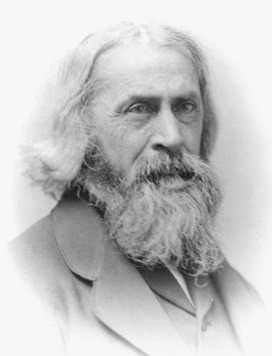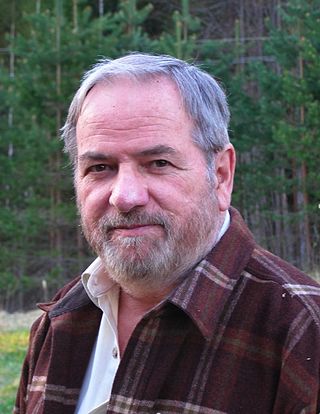
Charles Sanders Peirce was an American scientist, mathematician, logician, and philosopher who is sometimes known as "the father of pragmatism". According to philosopher Paul Weiss, Peirce was "the most original and versatile of America's philosophers and America's greatest logician". Bertrand Russell wrote "he was one of the most original minds of the later nineteenth century and certainly the greatest American thinker ever".
Semiotics is the systematic study of sign processes and the communication of meaning. In semiotics, a sign is defined as anything that communicates intentional and unintentional meaning or feelings to the sign's interpreter.

William James was an American philosopher and psychologist, and the first educator to offer a psychology course in the United States. James is considered to be a leading thinker of the late 19th century, one of the most influential philosophers of the United States, and the "Father of American psychology."

Pragmatism is a philosophical tradition that views language and thought as tools for prediction, problem solving, and action, rather than describing, representing, or mirroring reality. Pragmatists contend that most philosophical topics—such as the nature of knowledge, language, concepts, meaning, belief, and science—are all best viewed in terms of their practical uses and successes.
Charles William Morris was an American philosopher and semiotician.

"Pragmaticism" is a term used by Charles Sanders Peirce for his pragmatic philosophy starting in 1905, in order to distance himself and it from pragmatism, the original name, which had been used in a manner he did not approve of in the "literary journals". Peirce in 1905 announced his coinage "pragmaticism", saying that it was "ugly enough to be safe from kidnappers". Today, outside of philosophy, "pragmatism" is often taken to refer to a compromise of aims or principles, even a ruthless search for mercenary advantage. Peirce gave other or more specific reasons for the distinction in a surviving draft letter that year and in later writings. Peirce's pragmatism, that is, pragmaticism, differed in Peirce's view from other pragmatisms by its commitments to the spirit of strict logic, the immutability of truth, the reality of infinity, and the difference between (1) actively willing to control thought, to doubt, to weigh reasons, and (2) willing not to exert the will, willing to believe. In his view his pragmatism is, strictly speaking, not itself a whole philosophy, but instead a general method for the clarification of ideas. He first publicly formulated his pragmatism as an aspect of scientific logic along with principles of statistics and modes of inference in his "Illustrations of the Logic of Science" series of articles in 1877-8.

Benjamin Peirce was an American mathematician who taught at Harvard University for approximately 50 years. He made contributions to celestial mechanics, statistics, number theory, algebra, and the philosophy of mathematics.
Clarence Irving Lewis, usually cited as C. I. Lewis, was an American academic philosopher. He is considered the progenitor of modern modal logic and the founder of conceptual pragmatism. First a noted logician, he later branched into epistemology, and during the last 20 years of his life, he wrote much on ethics. The New York Times memorialized him as "a leading authority on symbolic logic and on the philosophic concepts of knowledge and value." He was the first to coin the term "Qualia" as it is used today in philosophy, linguistics, and cognitive sciences.

Nicholas Rescher was a German-born American philosopher, polymath, and author, who was a professor of philosophy at the University of Pittsburgh from 1961. He was chairman of the Center for Philosophy of Science and chairman of the philosophy department.

Thomas Albert Sebeok was a Hungarian-born American polymath, semiotician, and linguist. As one of the founders of the biosemiotics field, he studied non-human and cross-species signaling and communication. He is also known for his work in the development of long-time nuclear waste warning messages, in which he worked with the Human Interference Task Force to create methods for keeping the inhabitants of Earth away from buried nuclear waste that will still be hazardous 10,000 or more years in the future.

Karl-Otto Apel was a German philosopher and Professor Emeritus at the University of Frankfurt am Main. He specialized on the philosophy of language and was thus considered a communication theorist. He developed a distinctive philosophical approach which he called "transcendental pragmatics."
Roberta "Bobbie" Kevelson was an American academic and semiotician. She was an acknowledged authority on the pragmatism theories of Charles Sanders Peirce.

This Charles Sanders Peirce bibliography consolidates numerous references to the writings of Charles Sanders Peirce, including letters, manuscripts, publications, and Nachlass. For an extensive chronological list of Peirce's works, see the Chronologische Übersicht on the Schriften (Writings) page for Charles Sanders Peirce.

John Deely was an American philosopher and semiotician. He was a professor of philosophy at Saint Vincent College and Seminary in Latrobe, Pennsylvania. Prior to this, he held the Rudman Chair of Graduate Philosophy at the Center for Thomistic Studies, located at the University of St. Thomas (Houston).

John William Miller (1895–1978) was an American philosopher in the idealist tradition. His work appears in six published volumes, including The Paradox of Cause (1978) and most recently The Task of Criticism (2006). His principal philosophical ambitions were 1) to reconcile the idealism of Josiah Royce and the pragmatism of William James and 2) to integrate philosophical thought and historical thought. As testimony to the integrative nature of his thinking, Miller referred to his philosophy as a "historical idealism” and a “naturalistic idealism.”

Robert S. Corrington is an American philosopher and author of many books exploring human interpretation of the universe as well as biographies on C.S. Peirce and Wilhelm Reich. He is currently the Henry Anson Buttz Professor of Philosophical Theology at Drew University in Madison, New Jersey. Before that he was a professor at Pennsylvania State University. He is a Senior Fellow of the American Institute for Philosophical and Cultural Thought.

Charles Sanders Peirce began writing on semiotics, which he also called semeiotics, meaning the philosophical study of signs, in the 1860s, around the time that he devised his system of three categories. During the 20th century, the term "semiotics" was adopted to cover all tendencies of sign researches, including Ferdinand de Saussure's semiology, which began in linguistics as a completely separate tradition.
Peter W. Ochs is the Edgar M. Bronfman Professor of Modern Judaic Studies at the University of Virginia, where he has served since 1997. He is an influential thinker whose interests include Jewish philosophy and theology, modern and postmodern philosophical theology, pragmatism, and semiotics. Ochs coined the term "scriptural reasoning" and is the co-founder of the Society for Scriptural Reasoning, which promotes interfaith dialog among Christians, Jews, and Muslims through scriptural study groups. He is also a co-founder of the Children of Abraham Institute, which promotes interfaith study and dialog among members of the Abrahamic religions.

John Jeremy Stuhr is an American philosopher who teaches at Emory University. He has written extensively about a wide assortment of philosophical figures and movements as well as a broad array of cultural problems and issues. His work is known for its lively, engaged, and direct style. He draws critically on thinkers from often separated philosophical traditions. Revealing his impatience with narrow and academic conceptions of philosophy, his writings make deep and consistent use of poetry, painting, photography, and the lyrics of contemporary music, and they exhibit a broad interdisciplinary reach across fields such as rhetoric, media studies, relativity theory, political and legal theory, cultural geography, and economics.

Scott L. Pratt is a professor of philosophy at the University of Oregon. His research and teaching is focused primarily upon American philosophy, especially in the areas of Native American philosophy, pragmatism, philosophy of race and gender, philosophy of education, and the history of logic. He has previously served in various administrative roles at the University of Oregon, including executive vice provost for academic affairs (2017–2019), dean of the graduate school (2015–2017), and associate dean for the humanities in the College of Arts and Sciences (2006–2009).











